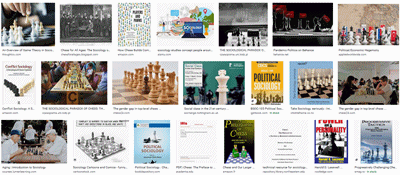The Sociology of Chess in Images
One of the most important posts in this series on The Sociology of Chess (November 2016) was Chess as an Institution (January 2017), which featured an embedded Youtube video. At some time after I posted it, the video disappeared. For this post I set out to find a replacement video, was quickly successful, then added a link to the 'Institution' post.
Still having some time on my hands and mindful that the fifth anniversary of the 'Sociology' series was approaching, I created the image below. Then I analyzed it image by image using a technique last seen in Books on Soviet Chess History (May 2019).

Google image search on 'chess sociology'
[Call the rows 'A' to 'C' (from top to bottom) and number the images in each row '1' to '8' (from left to right).]
Most of the small thumbnail images have nothing to do with chess, but use the game to illustrate a particular sociological theme. For example, the first thumbnail (A1) leads to An Overview of Game Theory in Sociology (thoughtco.com), where chess gets a single, passing mention because a 'player must look ahead'.
The second thumbnail (A2) leads to the same post titled 'Sociology of Chess' mentioned in the first paragraph above. The third thumbnail (A3) is for a resource that I introduced in 'Players and Pawns' (January 2019), Gary Alan Fine's 'Players and Pawns: How Chess Builds Community and Culture', an important book that I still haven't read.
Two of the thumbnails are for sites that specialize in stock images. I went one step further to search for all chess images on each site:-
- A4: Chess : Stock Photos and Images (140,988) (alamy.com)
- C2: Chess Cartoons : 401 results (cartoonstock.com)
As for search results that really have something to do with both sociology *and* chess, three references were repeated in separate results. The first two are for a PDFs, where the titles can be used to locate the papers.
A5/B2: 'The Sociological Paradox of Chess: The transclass distinction of the game of kings' by Krzysztof Olechnicki • 'Abstract: The article deals with the sociological paradox of chess. On the one hand, this game gives people who belong to its social world a kind of desirable distinction, but on the other hand this distinction is not connected with the class position. In Pierre Bourdieu’s terms, if we treat chess as part of the sports field, then class distinction should be interconnected with it. [...]'
C4/C6: 'Chess: The Preface to a Technical Resource for Sociology' by Michael W. Raphael • 'Abstract/Description: The metaphorical applications of chess to life date back prior to the thirteenth century and are still operating in modern narratives across many disciplines. The definition of "chess" varies across these narratives - some of which are problematic for moving beyond the mere "chess" metaphor. [...]'
The third repeated result, from a well known and respected chess site, is an issue that arises repeatedly. See, for example, an earlier post on this blog, Chess and Gender Lines (March 2019).
B3/B7: The gender gap in top-level chess (chess24.com; by chess24 staff)
Finally, here are a couple of titles where the connection to chess is obvious, but the connection to sociology is less obvious, at least for me.
C5: 'A Philosophy of Chess - A Sociological Allegory; Parallelisms Between the Game of Chess and Our Larger Human Affairs' by Dale Lancaster
C8: 'Progressive Tactics - 1002 Progressively Challenging Chess Tactics' by Dave Couture
Why is it that browsing image results is often more productive than browsing text results?




No comments:
Post a Comment